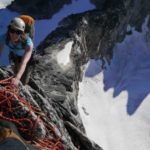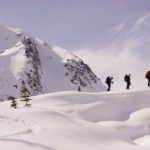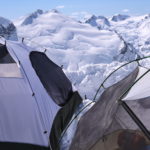5 tips to get into backcountry ski touring
Get out there.
Training and Mentorship
Start a conversation with someone that has the experience to get an idea if touring is in your realm of possibilities in the backcountry and get the scoop on the challenges that come with it. Experienced friends can be helpful in starting out but may mislead you with poor-practices or bad communication. Hire a guide if you want to make sure that you’re getting the latest information and learning the best practices. Check to see if there are local mentorship programs available in your area. Avalanche safety courses are strongly advised to practice using the rescue gear and understand the inherent risks in the snowy mountains.
Gear Knowledge
Renting or borrowing equipment for the first few tours seems to be a common way of approaching the issue of not owning backcountry touring gear. Buying equipment can be committing and a bit intimidating with all the brands out there. Once you have built your own kit, it can be liberating to be able to go out when you want. The backcountry environment brings inherent risks so traveling with the standard kit at all times is strongly advised: Although people have been ski-touring for a long time, it seems within the past 5 years that the technology in equipment has really took big leaps forward.
Basic Personal Kit:
- Skis/Splitboard, Skins, Poles, Boots
- Avalanche Transceiver, Shovel (Metal), Probe (>240cm)
- Clothing (technical layering system for changing conditions, no cotton)
- Gloves (at least 2 pair, up-hill and down-hill)
- Backpack (20-40L with an internal shovel/probe pocket)
- Goggles, sunglasses, hat, toque, helmet
- Food/Water (1-2L per day, a thermos of hot tea goes a long way)
- Sunscreen, Lip Balm
- Multi-Tool
- Altimeter watch
Basic Group Kit :
- Map/Compass
- Emergency communication devices (cell phone, satellite messenger, radios)
- First Aid Kit (pocket mask, gloves, gauze, band-aids, bandages, emergency medication, tape, tweezers, pain killers, splint system, etc)
- Binding/Boot Repair Kit (ski straps, extra binding parts, tape, bailing wire, etc)
- Light bivy sac/tarp (emergency shelter/liter for evacuating someone)
- Skin wax, ski scraper
- Snow study kit
Navigation and snow travel basics
Common mistakes in backcountry travel is that people don’t realize the nature of the terrain they’re getting it or they get lost. Having a route plan and staying in SIMPLE terrain can keep your first experiences mellow and enjoyable. Don’t bite off more than you can chew and stay humble to the constantly changing winter environment. Travel times and distances vary drastically to summer hiking in the mountains and rescue is often much more difficult in the winter. Researching the area you’ll be in and practicing with a map and compass are irreplaceable skills for ski touring.
Weather comprehension
Check the weather and understand how it changes the snow and travel conditions. Having a good idea of temperatures, wind speed/direction, and precipitation likelihood can keep you out of situations where the deteriorating weather can increase your exposure. Start with your basic weather sites and then dive into more specific forecasts and models to anticipate what your day with look/feel like. Learning the ins and outs of mountain weather takes a lifetime to master and even then, experts are often surprised. Avalanche conditions are directly affected by the weather and often there is quite a lot of spatial variability between ski zones. Local weather knowledge is a big help in predicting where the skiing will be best with the given conditions and where to avoid.
Get out there!
The only way to get better and gain experience is to stick your nose out and be open to learning. We all start as beginners at some point and if you’re patient, humble, and disciplined, progression happens pretty quick. Getting out with experienced people in commonly traveled areas can help increase mileage and keep the hazards manageable. Try to find out what you don’t know and seek out that information. If there continue to be knowledge gaps over time, seek out another course or guided day, you’ll never regret it. Weekly check-ins with yourself can be a great idea in this process so you can do your best to be a safe and reliable partner.





